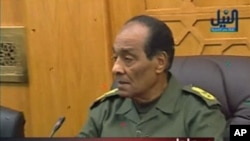A body of Egyptian military leaders took control on Friday of the country following the resignation of President Hosni Mubarak.
Egypt's Supreme Council of the Armed Forces represents the heads of the various branches of the armed forces, as well as the chief of staff and the mininster of defense.
Here are some key members:
Defense Minister Mohamed Hussein Tantawi
Head of the Supreme Council, Tantawi was appointed minister of defense and commander-in-chief of the armed forces In 1991. During recent protests, he was also promoted to deputy prime minister, while retaining his title as minister of defense.
The 75-year-old Field Marshal has been mentioned as a possible candidate for presidency. On Thursday, Tantawi chaired a meeting of the Supreme Council with neither President Hosni Mubarak nor Vice President Omar Suleiman present. He also visited Cairo's Tahrir Square on Friday.
Armed Forces Chief of Staff Sami Hafez Anan (Enan)
He has held his current position since 2005. Anan has specialized training in air defense. He has risen through the military ranks since serving as a battalion commander in 1981.
In late January, he cut short a visit to the United States and returned to Cairo in the wake of growing anti-government unrest.
Air Force Commander Reda Mahmoud Hafez Mohamed
In 1991, he served as an air wing chief of staff. He continued to move up the military's ranks, holding positions that included eastern and southern Air Zone Commander between 2003 and 2005. He became the air force Chief of Staff in 2007 and Air Force Commander the following year.
Other members include: Navy Commander Mohab Mamish and Air Defense Commander Abd El Aziz Seif-Eldeen.
Two other military leaders were prominent members of the Mubarak government. Their role in the country's affairs is now unclear. But the Egyptian military plans to issue a statement on Friday explaining how governance of the nation will move forward.
Vice President Omar Suleiman
A close ally of Mr. Mubarak, he served as head of Egyptian intelligence since 1993 before being appointed vice president in January. Suleiman studied at an Egyptian military academy and became head of the Armed Forces' General Operations Authority in 1992.
Also, he earned international respect for his role as a mediator in Middle East affairs and for curbing Islamic extremism. He has dealt with diplomacy involving the Middle East peace process and has had extensive discussion with U.S. and Israeli officials.
Prime Minister Ahmed Shafiq
He is a former air force commander who had served as the minister of civil aviation since 2002. He was a fighter pilot who served as commander of the Egyptian air force between 1996 and 2002.
Egyptian Military Takes Control




